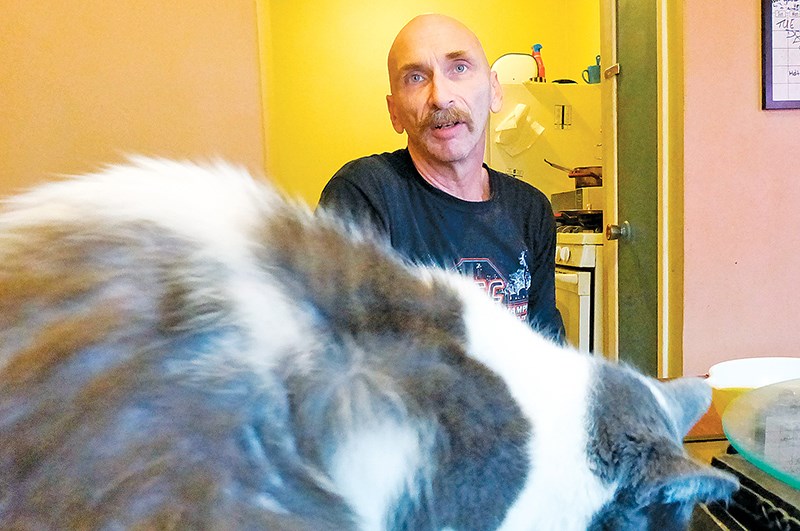George Mathewson
Set the cat has now recovered but for one dark night in December he embodied his namesake, the Egyptian god of chaos and violence.
The big male feline was in the backyard of his Lanark Crescent home when he was badly mauled, the victim of an apparent coyote attack.
Owner Dennis Grant said he woke around 1 a.m. to his two dogs barking madly at the back door. When he opened it, Grant saw something jump the back fence and two dog-like animals take off.
His terrified cat suffered numerous bite wounds and lost large patches of fur.
“If it wasn’t for my dogs Set would have been dead,” Grant said.
“I want people to be aware that coyotes are out there, and they are a danger to pets.”
Grant’s home in south Sarnia is about 500 meters from the Howard Watson Nature Trail, a known travel corridor for the city’s urban coyotes.
Though most residents are unaware of their presence, coyotes are a fixture of Sarnia’s urban wildlife and have been for more than a decade.
Wary of humans, they are encountered mostly at night, individually or in small groups, most often around Canatara Park, the Lake Huron shoreline, the city’s trail network and occasionally on streets and in parks.
Though coyote attacks on people are extremely rare, Grant said he worries about the safety of small children. His son Beau, 7, is non-verbal and has autism.
“If he saw a coyote in the backyard he would walk right up to it. Is it everyone’s responsibility to secure their own backyard against coyotes?’ he asked. “Shouldn’t the city be doing something about this?”
Actually, city hall is not responsible for coyotes, only domestic animals, livestock and exotic pets, said Alan Shaw, manager of Sarnia’s new bylaw enforcement division.
“We have no authority to deal with wildlife,” he said.
Wildlife falls under the Ministry of Natural Resources, which has made it clear it has no intention of trapping, killing or otherwise removing coyotes from Ontario cities except in extreme cases.
If Sarnia did take action, “we could actually place ourselves in a legal situation with the ministry,” Shaw said.
“They try to minimize conflicts between people and wildlife, but they don’t necessarily believe wildlife shouldn’t be allowed to integrate slightly with humans.”
The ministry advises residents to keep pets indoors at night, to put out garbage only on collection day, and to call 911 if a wild animal poses an immediate threat to public safety.
Set, who was rescued as a kitten after being found in a sack abandoned on the road, has used up some of his nine lives, Grant said.
Though recovered from his most recent injuries, the cat hides in the basement and doesn’t want to go outside anymore, Grant said.
“He’s had quite a life.”
